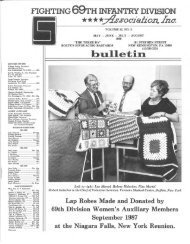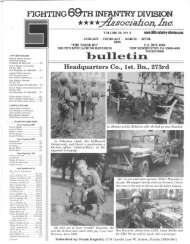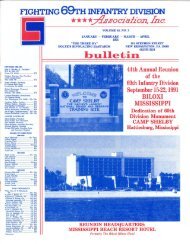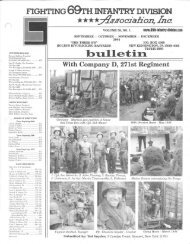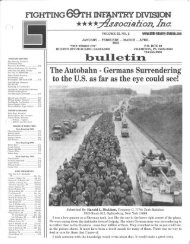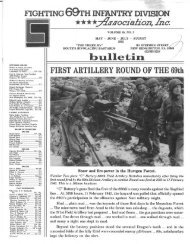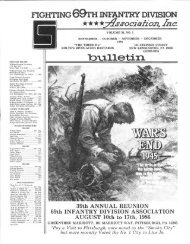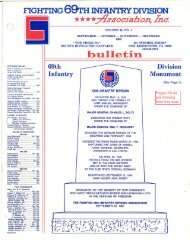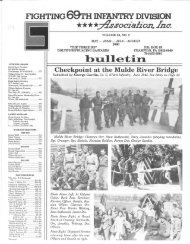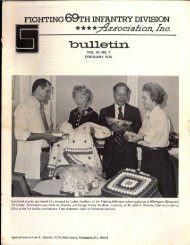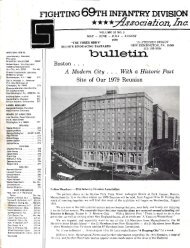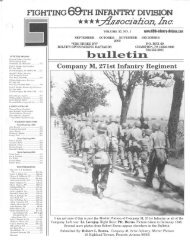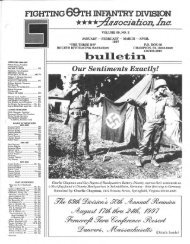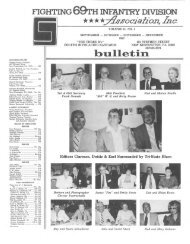The Fighting 69th Infantry Division Association, Inc. Vol. 57 No. 3 ...
The Fighting 69th Infantry Division Association, Inc. Vol. 57 No. 3 ...
The Fighting 69th Infantry Division Association, Inc. Vol. 57 No. 3 ...
Create successful ePaper yourself
Turn your PDF publications into a flip-book with our unique Google optimized e-Paper software.
Personal History of WWII<br />
Written By: Francis G. Blais - ASN 11111 231<br />
Headquarters, 3rd Battalion, 273rd <strong>Infantry</strong><br />
603 Church Road<br />
Reisterstown, Maryland 21136-6105<br />
Prior to the beginning of WWII, I was employed as<br />
a Colorist at the Pontiac R.I. Finishing Plant for cotton<br />
cloth made under the Fruit of the Loom label. <strong>The</strong><br />
work was clerical in nature and highly specialized, and<br />
paid very well. While attending high school I had run<br />
a modestly successful trap line and was an avid hunter<br />
and outdoorsman. I was a pretty good shot with both<br />
rifle and shotgun. I was also active with the Boy<br />
Scouts having been a member since I was a 12. By<br />
early 1940, my friends and I were convinced that the<br />
u.s. would eventually enter the war. My best friend<br />
joined the National Guard. I considered joining but<br />
never did. Shortly thereafter the National Guard was<br />
called to active service.<br />
On Sunday December 7th, our family had returned<br />
from church and Dad had turned on the radio when<br />
the news came. <strong>The</strong> Japs had attacked Pearl Harbor<br />
and the damage to our fleet was tremendous. I wanted<br />
to enlist immediately but I was under age, and my parents<br />
would not sign for me, counseling that I should<br />
wait for the draft. By late summer of 1942, having<br />
passed my 21st Birthday, I decided to enlist. I quit my<br />
job, and gave myself a month's vacation. On <strong>No</strong>vember<br />
2nd, 1942, I took the bus to Providence and walked<br />
into the Army Recruiting Office. About 6 hours later I<br />
walked out, a private in the United States Army.<br />
Two days later I found myself in Fort Devens,<br />
Massachusetts. For another two days I shuffled along<br />
in long lines of thoroughly confused people like myself.<br />
We got an overall physical exam, then came eye exam,<br />
dental exams, reflex and coordination exams; finally<br />
we were stripped naked for the umpteenth time and<br />
given shots against every disease known to mankind.<br />
In the last line we had an entire wardrobe of clothes<br />
thrown at us. Amazingly enough they were pretty good<br />
fits. From the care that went into fitting our shoes, we<br />
should have known we were destined for the <strong>Infantry</strong>.<br />
<strong>The</strong> one bright spot in our existence was chow time.<br />
<strong>The</strong> food, although sometimes a bit foreign to us, was<br />
good, hot and plentiful. We were assigned to a barracks<br />
and a cot. <strong>The</strong> mattress was O.K. but we spent very<br />
little time on it. It was here that I learned my first<br />
lesson. Keep a close watch over your property! My<br />
brand new field jacket was stolen before I even had a<br />
chance to try it on. It took me two hours before I had<br />
the opportunity to steal one from someone else.<br />
It rained during most of my stay at Devens. Nearly<br />
everyone came down with a cold. Coughing, sneezing<br />
and snuffling, we shuffled the numbing routine.<br />
Finally came the big day, I should say the night: At<br />
around 3:00 a.m. the barracks lights came on, everyone<br />
up and get dressed. Dress was to be fatigues, except for<br />
overcoats which were to be worn, everything else went<br />
into the Barracks Bag. Once outside we lined up for a<br />
trip to the mess hall. <strong>The</strong>re we waited at least a half<br />
- 31-<br />
hour before being admitted. After breakfast, we went<br />
back to the barrack, collected our bags and fell in for<br />
Roll Call. We then climbed into waiting trucks for the<br />
short ride to the Railway Station. <strong>The</strong>re we milled<br />
around for a while. After another headcount we boarded<br />
a long line of day coaches, some of which appeared<br />
to be of WWI vintage. On board, a minor miracle took<br />
place: Everyone was able to find a seat.<br />
On board we received the usual number of Don'ts:<br />
<strong>The</strong> only one I remember was the prohibition against<br />
raising the curtains over the windows. How many days<br />
we were on that train I do not remember but it was for<br />
more than two nights. En route we spent long waits on<br />
sidings while other trains roared past. Some men who<br />
claimed to have recognized some station or other swore<br />
that we passed through the same station twice. Even I<br />
couldn't swallow that one. We did disembark at certain<br />
points where we were fed. It felt good to walk around<br />
a bit after sleeping all night in our seats fully dressed.<br />
Other than that, life was pretty dull and miserable.<br />
Our colds grew progressively worse; a few people were<br />
even taken off the train for hospitalization. A few card<br />
games started up but there was little money around<br />
and no one trusted anyone else anyway. We spent most<br />
of our time dozing or endlessly speculating as to our<br />
destination. All bad as well as good things eventually<br />
come to an end. We arrived at our destination, Camp<br />
Breckenridge, Kentucky.<br />
At that time Camp Breckenridge was one glorious<br />
big mud hole. Many of the buildings were still under<br />
construction. Troops were being moved into barracks<br />
where the paint was not yet fully dry. <strong>The</strong> roads and<br />
streets were paved, but the grounds around the<br />
Barracks, Mess Hall and other buildings were a sea of<br />
mud. <strong>The</strong> other part of the Camp was occupied by<br />
another <strong>Division</strong> which had apparently arrived much<br />
earlier and there, conditions were much better. For a<br />
while we even had to use their PX. I give credit to the<br />
construction crews, they worked like beavers, and it<br />
was not long before conditions became significantly<br />
improved: Except, of course, for that sticky yellow clay<br />
mud and that miserable rain.<br />
I found myself assigned to an Anti-Tank Company<br />
(forgot which Regiment) of the 98th <strong>Infantry</strong> <strong>Division</strong>.<br />
Our Basic Training would begin immediately. Our<br />
Instructors were a Cadre composed of a normal compliment<br />
of Company Grade Officers (second Lieutenants)<br />
and 1st. Three Grade <strong>No</strong>n Coms. <strong>The</strong> concept was to<br />
fill the TOE later, by promoting selected trainees to<br />
the lower non-commissioned grades after the completion<br />
of basic training.<br />
<strong>The</strong> Lieutenant Platoon Leaders were an assortment<br />
of graduates from VMI, ROTC and Ft. Benning.<br />
<strong>The</strong> only thing they had in common was a college<br />
degree. As a group they were the first three graders;<br />
who were all regular Army people with four to 12 years<br />
of service. <strong>The</strong>y were the only ones who appeared to<br />
know what they were doing.<br />
(Continued on Page 32)



